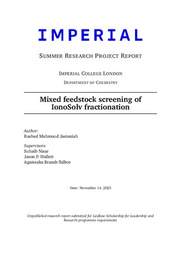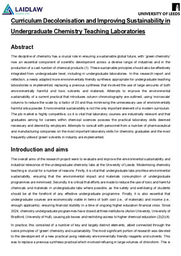Project Outline: Developing a Behavioral and System-Level Tool to Detect AI-Generated Content in Academic Writing

Academic Integrity in a Generative AI Era: Behavioral Detection of AI-Generated Content in Academic Writing
Supervisors: Dr. Hitesh Tewari, School of Computer Science and Statistics, Trinity College Dublin; Professor David Lewis, School of Computer Science and Statistics, Trinity College Dublin
As generative AI becomes increasingly common in academic life, educational institutions face a critical challenge: how to uphold academic integrity without resorting to unreliable or invasive detection methods. This project proposes a new direction to address this; focusing not on what students write, but how they write. By developing a proof of concept that captures the writing process itself through keystroke logging, AI interaction tracking, and version control, this research offers a more transparent, fair, and technically grounded alternative to current AI-detection tools. It combines system design with ethical inquiry to help institutions adapt meaningfully to a rapidly changing academic landscape.
Project Background
The rapid rise of generative AI tools has disrupted traditional models of academic integrity, challenging how institutions detect and regulate AI-generated content. Current AI detection systems often rely on linguistic cues, tone analysis, or stylistic markers. Unfortunately, these methods are increasingly unreliable as AI models become more sophisticated and human-like in their outputs. These methods risk both false positives (misidentifying student work as AI-generated) and false negatives (missing high-quality AI content). This project addresses this gap by proposing a novel system that shifts focus from analyzing the final written product to monitoring the writing process itself. By developing a proof of concept that integrates keystroke logging and AI interaction tracking, this research aims to offer a transparent, process-oriented approach to safeguarding academic integrity in the age of AI.
Research Questions
This research seeks to explore several core questions. First, it asks how behavioral data- such as keystroke patterns and real-time interactions with AI tools- can be used to identify AI-generated content in a way that is more reliable than linguistic analysis alone. It also investigates what ethical and technical frameworks are necessary to ensure that such a system respects student privacy while maintaining academic standards. Furthermore, the project aims to compare the efficacy and trustworthiness of this process-based approach to existing content-focused AI detectors. Finally, it examines the limitations of behavioral detection methods and the scenarios in which they might fail, providing a critical foundation for further refinement.
Objectives
The primary objective of this project is to design and demonstrate a proof of concept for a non-linguistic AI detection framework based on user behavior during the writing process. It aims to create a prototype that captures keystroke data, flags suspicious actions like mass pasting or extended inactivity, and records AI queries used during the writing session. Beyond technical development, the project seeks to evaluate how such a system could be scaled and ethically integrated into institutional settings. It also aims to explore how this approach can better align with principles of fairness, transparency, and accuracy, especially compared to traditional detection methods that may inadvertently penalize students for certain writing styles.
Methodology
The research will unfold over three interconnected phases. The first phase involves a detailed literature and technical review of relevant topics, including keystroke dynamics and AI-detection models. This stage will inform the theoretical basis for the system’s design. The second phase focuses on building a functional prototype that can log writing behavior, track AI interactions, and identify inconsistencies that may signal AI-generated content. This prototype will simulate realistic academic writing scenarios and be iteratively refined based on performance and feedback. The final phase centers on evaluating the system through testing and critical reflection. This includes an ethical review of data privacy concerns, an assessment of institutional adoption feasibility, and informal feedback from academic stakeholders. Together, these phases aim to produce not only a working model but also a deeper understanding of how academic integrity can be preserved in the age of AI.
For further updates, you can find me on LinkedIn here. The proposed prototype will be available on GitHub here.





Please sign in
If you are a registered user on Laidlaw Scholars Network, please sign in